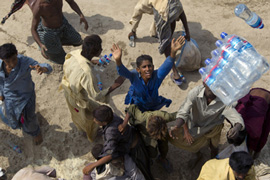Mass evacuation in Pakistan
Thousands flee another wave of floodwater as Indus river burst its banks in Sindh.

Ban Ki-moon, the UN secretary general said the disaster was the worst he had ever seen. He urged the international community to speed up assistance.
On Monday a UN spokesman said up to 3.5 million children were at high risk from deadly water-borne diseases as a result of the flooding.
Protest over aid
Meanwhile hundreds of victims of the disaster blocked a major road with stones and rubbish near the hard-hit Sukkur area in Sindh province, to protest what they described as a slow delivery of aid.
| Special coverage |
 |
Kalu Mangiani, one of the protesters, said government officials only came to hand out food when media were present.
“They are throwing packets of food to us like we are dogs. They are making people fight for these packets,” he said.
Pakistan’s floods have killed at least 1,500 people and damaged 3.2 million hectares (7.9 million acres) of cotton, sugar cane and wheat crops.
Local charities and international agencies have helped hundreds of thousands of people with food, water, shelter and medical treatment, but the scale of the disaster has meant that many millions have received little or no assistance.
“Without a co-ordinated effort by the government or aid groups, delivering supplies becomes a piecemeal effort that falls short of what is needed,” Al Jazeera’s Imran Khan reported from the city of Sukkur.
| In video |
|
Flooding cuts off electricity in Pakistan |
“The scale of this disaster is overwhelming and the lack of a centralised effort means good intentions can go to waste.”
In western Punjab province, the army used boats to rescue residents of Pathan Gharr village, who said they had been trapped by the floods for six days.
In Charsadda, a town in northwestern Khyber Pakhtunkhwa province, the medical aid charity Medecins Sans Frontieres (Doctors Without Borders) distributed clean water to residents on Saturday.
The UN said the rate of diarrhoea continued to increase among survivors.
Cholera, which can spread rapidly after floods and other disasters, had also been detected in the northwest, where the floods first hit more than two weeks ago, after exceptionally heavy monsoon rains.
’20 million homeless’
Yousuf Raza Gilani, Pakistan’s prime minister, said on Saturday that 20 million people were now homeless in a nation of 180 million.
Ban Ki-moon met with Asif Ali Zardari, the Pakistani president, to discuss the situation on Sunday. The president has been heavily criticised for going ahead with a trip to Europe just as the crisis was unfolding.
 |
| The UN has urged the international community to speed up assistance [AFP] |
The coming months are likely to see food shortages and inflation that could lead to protests, riots and more discontent with the government.
The International Monetary Fund has warned of dire economic consequences in a country already reliant on foreign aid to keep its economy afloat.
The world body has appealed for an initial $460 million to provide relief, but only 20 per cent has been pledged.
The United States has so far donated the most to the relief effort, at least 70 million, and has sent military helicopters to rescue stranded people and drop off food and water.
Washington hopes the assistance will support a pivotal regional ally and help improve its image in the country, however marginally, as it seeks its support against Taliban fighters and al-Qaeda.